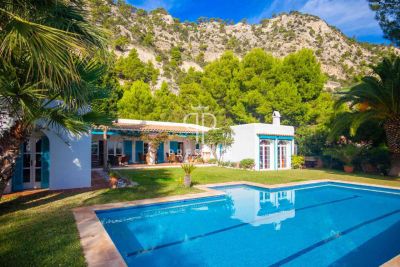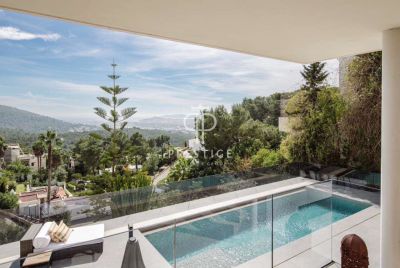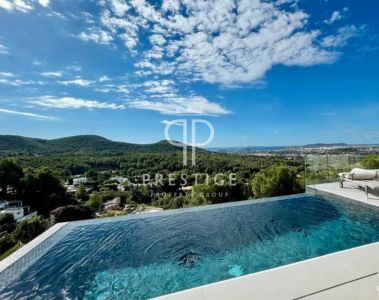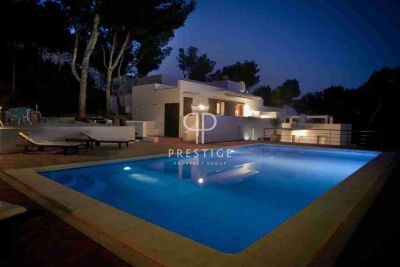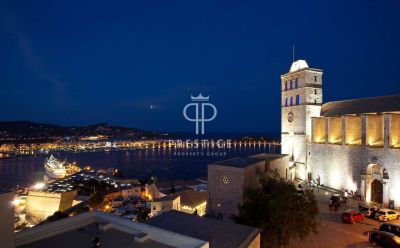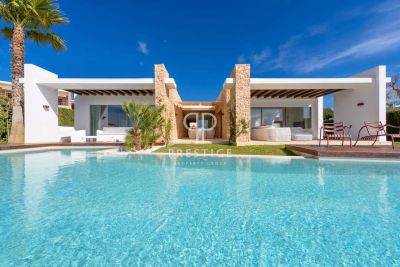Ibiza Property For Sale
Area Guide
The nearest of the three Balearic Islands to the Spanish mainland, Ibiza remained almost unknown to tourism until the 1960s. Measuring just 14km wide and 42km long, it has 72 beaches, a wealth of cultural and historic diversions, superb restaurants offering both traditional Ibicenco cuising and international fare, and diverse leisure facilities. While it is well-known as a clubber’s paradise, this holds true only in the main urbanisations such as Calle de la Virgin and San Antonio; much of the island retains its old charm, with the northern countryside in particular a patchwork of fruit trees, wooded hills and small rural villages with attractive Ibiza properties for sale.
Though it remains popular with package holidaymakers, Ibiza has started to go a bit more upmarket. Many new build developments are tapping into the recent lethargy of the mainland property market and the discovery of Ibiza by tourists who are eager to find a good mixture of old world charm and the convenience of modern living. There is Ibiza property that caters for all budgets, from small studio apartments nearer the cosmopolitan hustle and bustle of the main towns to expensive villas that offer peaceful solitude, with exciting nightlife on such a small island just a short drive away.
In recent years, Ibiza property has enjoyed an annual capital appreciation of between 15 and 40%, making it an excellent investment. Major tourism makes renting out your Ibiza property lucrative as more and more Europeans discover its charms. San Antonio, despite its reputation, is actually a nice mix of tourist areas and local shops, bars and restaurants. Prices for apartments in the towns start at around 100,000 EUR, villas from around 250,000 EUR.
With many new infrastructures being put in place, the island is becoming ever more attractive to permanent and holiday home buyers looking for Ibiza property. These include a motorway between San Antonio and Eivissa, golf courses and two large marinas. A strengthening demand for short-let apartments for the summer season means prices for suitable, hard-wearing Ibiza properties for sale in popular areas have risen faster than the average.
Buying a Property in the Balearic Islands
1. Putting down a Holding Deposit
On finding a property you wish to purchase you will need to negotiate the terms, price and conditions of the sale with the owner. This part of the process is not binding. We would recommend using an independent English speaking legal advisor. Once a purchase price has been agreed, normally a holding or reserve deposit will be required to ensure the property is removed from the market. The sum required will vary between properties and will be based on the purchase price. A time limit for the preagreement to be signed will be arranged and there will also be legal checks to be made.
2. Setting up a Pre-agreement (Contrato privado de compraventa)
The pre-agreement will set out the conditions under which the Buyer and Seller agree to complete the purchase of the property and the price they have agreed upon. Relevant details will generally be included for example the property details, purchase price and the date for completion. A deposit will be required at this point, this will vary, but will generally be 10% of the agreed price. This agreement will include a penal clause if the sale does not go through. If the seller pulls out of the sale your compensation will be double the deposit you have paid, but if you decide not to go through with the sale then your deposit will be lost. Certain checks will need to be made before signing the contract, checks should be made against the title of the property, mortgage status and if the property has any debts held against it. The planning status should also be looked into. These conditions can be varied by the seller and the buyer and other types of agreement can be made.
3. The Contract (Escritura de compraventa)
Before a non-Spanish purchaser can buy a Spanish property they will need to have set up a Spanish bank account and obtained a Spanish tax number (NIE). The completion will take place in the presence of a Notary Public. This is a Spanish public official, by law the deed of sale must be witnessed by a Notary Public. You will also need your own independent, expert legal advisor to act on your behalf. On Completion the buyer must pay the balance, that is the price agreed after the deposit has been deducted, plus any other fees on the completion date. Both buyer and seller must sign the Escritura de compraventa contract, (this is the Spanish equivalent of the title deeds). The title deeds (escritura) will be given to the buyer, this will be done in the presence of a Notary Public, they will certify that the transfer has taken place. The tax office will be sent a copy and the property registry will be informed of the transfer.



